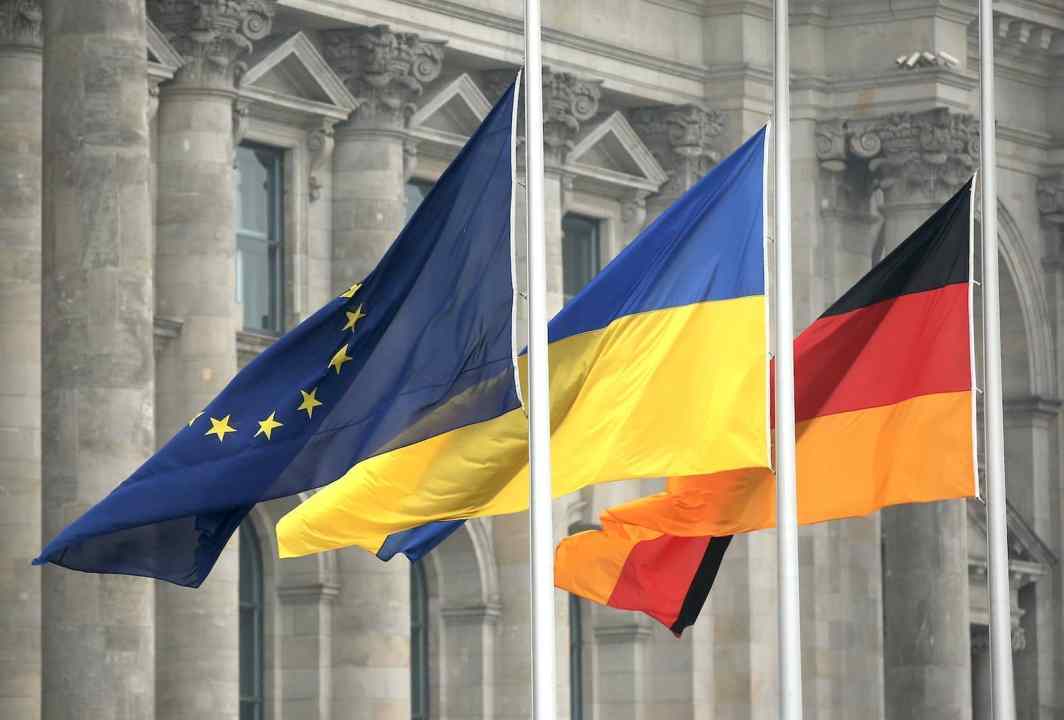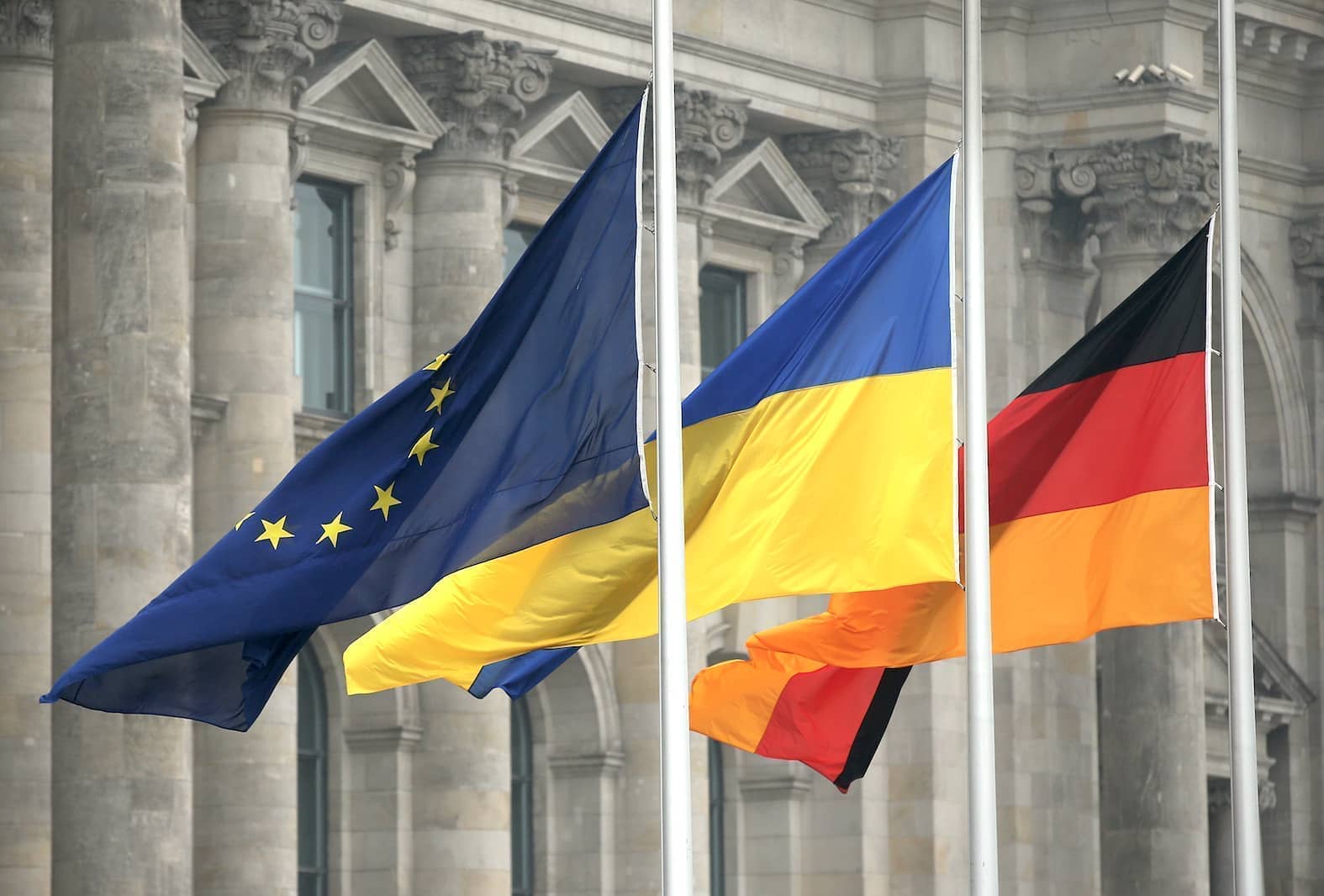Berlin, Germany
Germans have a complex relationship with their Erinnerungskultur, or ‘culture of memory’. Whenever the word appears, it almost invariably refers to how the country thinks about its difficult past. Determined never to forget the horrors of the Nazis, Germans have spent decades reflecting on the evil that their forbears unleashed upon the world.
And yet this process isn’t helping us understand our present. As a German-Canadian whose grandparents spent their childhoods in bomb shelters, I’ve long respected German memory culture. But events in Berlin on VE Day this past Sunday have shaken my faith. Today, Ukraine is revealing how little we actually understand about our history in Germany.
Ukraine’s valiant defence reminds us that freedom comes at a cost
Victory in Europe Day is typically sombre in Germany. There tend to be fewer flags than one might see at a British commemoration. Wreaths bearing understated German flags appear alongside a few flags of the allied powers. At the giant Soviet War Memorial in the eastern district of Treptow, some leave Russian flags.
This year’s commemoration started with Berlin’s mayor banning Russian flags from being displayed at these memorials. Then city authorities reasoned that Ukrainian flags could also provoke unrest. Perhaps violent pro-Russian activists might disrupt commemoration events. And so the Ukrainian flag was also banned. A video of Berlin Police confiscating a huge Ukrainian flag went viral on social media. Ukrainian foreign minister Dmytro Kuleba called it a mistake. ‘Taking a Ukrainian flag away from peaceful protestors is an attack on everyone who now defends Europe and Germany from Russian aggression with this flag in hands,’ he tweeted.
I spent Sunday both depressed and aghast. How could my city ban a flag that now stands for the defence of freedom and democracy – on the very anniversary of Europe’s liberation from another genocidal dictator? How could the mayor of a city that once sat at the centre of the struggle for democracy exhibit such a lack of awareness? It got worse.
Hours later, a German commentator lectured the Ukrainian ambassador on a popular Sunday night talk show. German social psychologist Harald Welzer ‘explained’ that the 45 per cent of Germans currently against delivering heavy weapons to Ukraine may have family members who experienced war and thus want a negotiated ceasefire. Weapon deliveries would only prolong the war and increase casualties, he argued. I watched it again. Did a German intellectual really just use the liberation of Europe to argue for a ceasefire with a modern-day dictator – to the ambassador of the country currently under attack? ‘I’m not a student,’ Melnyk replied tersely.
This kind of argument, one that is not uncommon in Germany, makes no sense. I grew up listening to my grandmother’s accounts of world war two and its aftermath. Many Germans experienced horrors at the hands of the Nazis along with their fellow Europeans. Many too did not escape the subsequent Soviet occupation unscathed either.
My Oma Elsie turned 15 just two days before 8 May 1945. Where they lived, in Soviet-occupied Chemnitz, Russian soldiers would sometimes stop and board trains, taking the prettiest girls and raping them. Elsie’s mother would scoop some dirt off the floor and rub her daughter’s face with it. She thought that if Elsie looked dirty, they might leave her alone. On another occasion, she ran from a predatory Russian soldier and hid with a friend in a nearby forest until long after dark.
Nearly two million German women were raped by Soviet soldiers. Although it’s difficult to know exactly how many because the topic has never been widely studied or discussed in German society. It hasn’t entered our debates – possibly because it challenges a German narrative that Russian soldiers helped liberate Europe from fascism. In reality, the Soviet Union simply replaced one brutal regime with another. In a country that espouses the virtues of its memory culture, why are certain traumas left forgotten?
If our thinking about history could adapt accordingly, we might view the systematic rape of Ukrainian women in more visceral, emotional terms. Perhaps, instead of endlessly debating the relative virtues of weapons versus diplomacy, we might be more motivated to act. Following decades of prosperity in Germany, Ukraine’s valiant defence reminds us that freedom comes at a cost. That’s a part of our European history that few of our allies need much help remembering. So why are so many of us still forgetting?
Having fled Chemnitz for West Germany at 16 before later emigrating to Canada, Oma Elsie Gasch also understood that freedom isn’t guaranteed. She knew there were times when it would have to be defended. Neville Chamberlain’s Munich Agreement didn’t defeat Hitler. A military victory did. Diplomacy didn’t end the Berlin blockade. The Berlin airlift did. And the Berlin Wall didn’t fall because Nato countries drew down their military spending. It fell because enough East Germans demanded their freedoms.
If we truly remembered those things, we might have a much clearer view of our present.






Comments